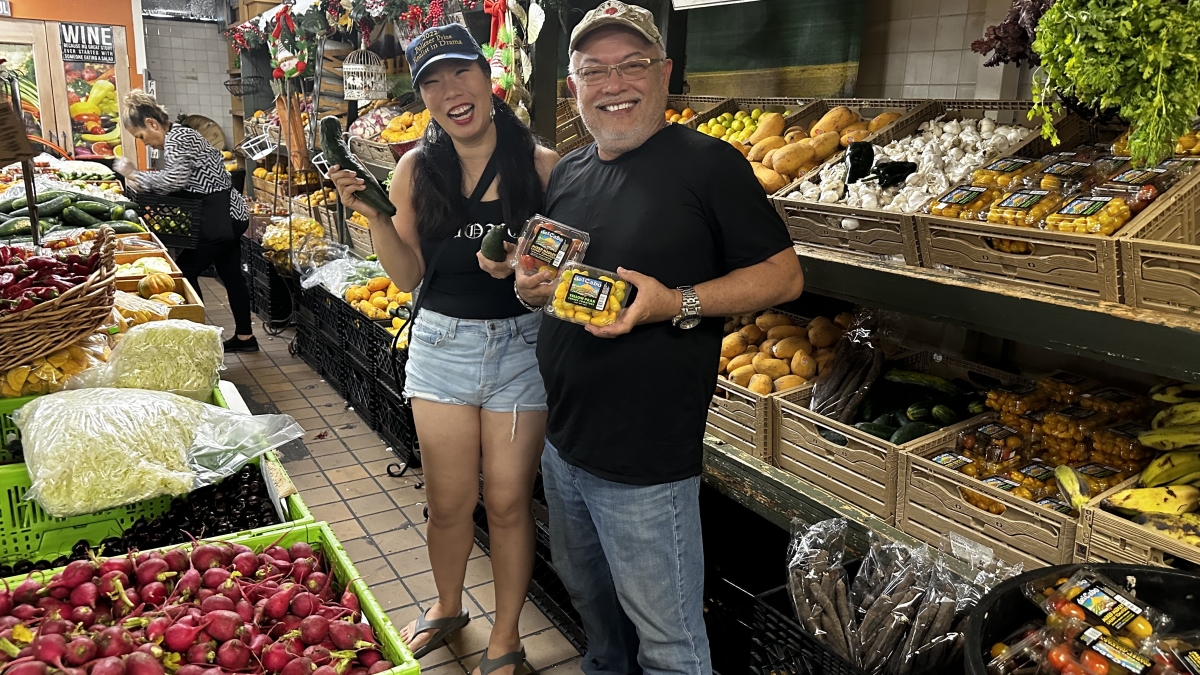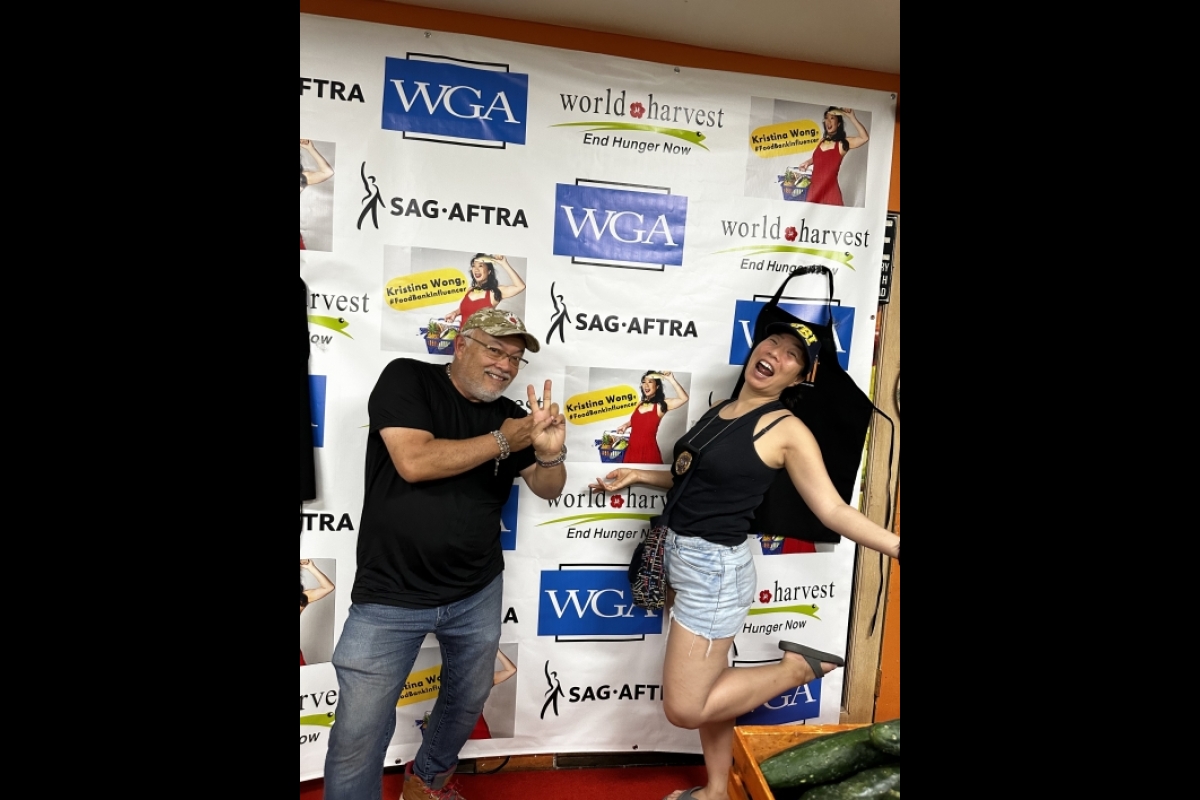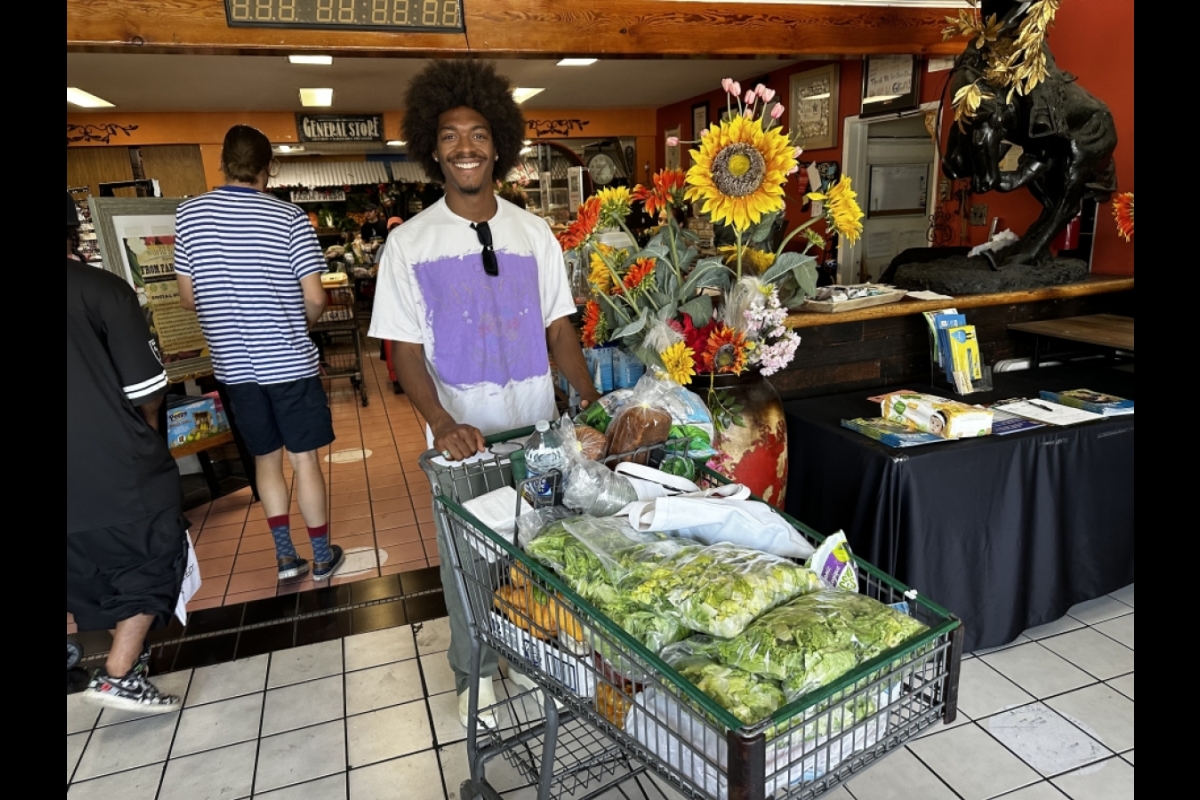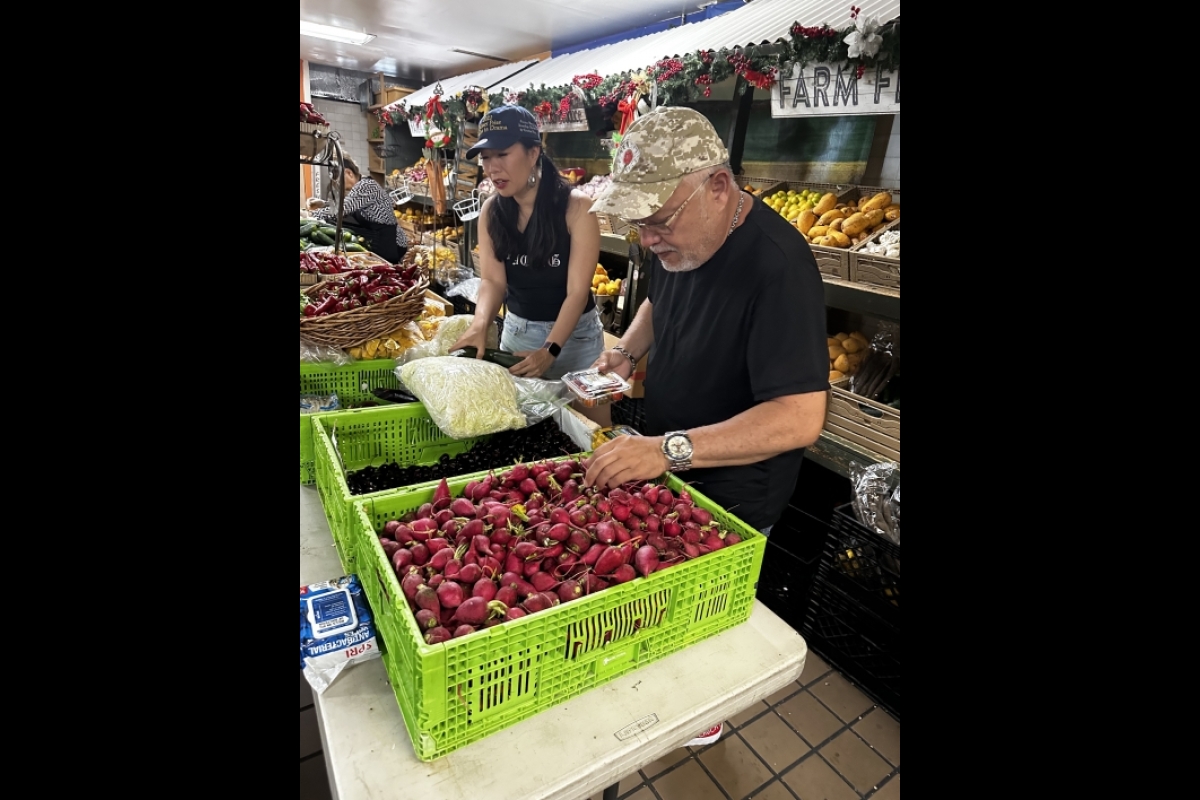Comedian Kristina Wong to deliver ASU Graduate College Distinguished Lecture Nov. 3

Kristina Wong and Glen Curado at World Harvest Food Bank in Arlington Heights, California. Photo courtesy Kristina Wong
In the politically stressful years before the COVID-19 pandemic, with a heavy workload full of performances and travel, Kristina Wong found relaxation during her downtime by binge-watching “food-haul” YouTube videos, where micro-influencers tried to make a week’s worth of meals on a meager budget.
“I’ve always had a difficult relationship with food as an adult. It was tied to traumatizing situations where I didn’t feel safe in my home, so I didn’t feel comfortable cooking. Also, food would often go bad or I’d cook and it didn’t taste good, so I thought I wasn’t good at cooking and the only way I could feed myself was either from a restaurant or out of a can,” she said.
Then, after a chance encounter, Wong found her life — and her relationship with food — forever changed. Today, the performance artist, comedian, actor and writer is known as the "Food Bank Influencer," using social media to promote the work of food banks and educate about food disparity.
This fall, Wong will serve as the keynote speaker at the ASU Graduate College Distinguished Lecture on Nov. 3. Her speech, “Sex, Lies, and Food Banks: Reimagining the Future of Emergency Food,” will cover food disparity, uncovering crucial resources and how students can jump-start personal activism. A reception of hors d’oeuvres will precede the lecture, followed by a 45-minute Q&A with Wong and guest panelists. Registration information coming soon.
The birth of the 'Food Bank Influencer'
Watching others make magic in the kitchen inspired her to try making healthful dinners on a budget. On the way to get her sewing machine fixed in Arlington Heights, California, she walked into the World Harvest Food Bank, mistaking it for a grocery store. While browsing the fully stocked aisles, Wong noticed something peculiar: There weren’t any prices. She was told at checkout that you could buy groceries a la carte or in bulk for cheaper than retail. World Harvest Food Bank also had an offer where customers could volunteer and fill a grocery cart for $55. Not wanting to take food from those in need, Wong returned a few weeks later to volunteer and struck up a conversation with CEO and owner Glen Curado.
“He just kept handing me sashimi-grade fish, flats of sour cream and fancy cheese. I never witnessed this kind of generosity before! (Meeting Glen) is where it started; when I came across this food bank, I was mind-blown about what it could be,” she recalled.
As a Doris Duke Artist Award winner, Guggenheim Fellow and a Pulitzer Prize finalist in drama, Wong is no stranger to thinking big and getting her message in front of the right people. Her career has spanned North America and broken ground internationally. With such an extensive reach, she began brainstorming how to use the newfound inspiration from the food bank for the greater good.
Wong leaped into being of service, and shortly after, the COVID-19 pandemic hit full force. Concurrent with volunteering, she started the Auntie Sewing Squad. This collaborative project focused on sewing and distributing masks to those in need. As more local businesses shut down, she worked almost around the clock, sewing to support the community. That is when an idea struck her: Both of these community-building initiatives could merge — the food bank could also have a significant impact during this time.
“(At the food bank), I saw Girl Scout cookies, Starbucks coffee and excess snacks from airlines because no one was flying,” Wong said. So she recruited the Auntie Sewing Squad, and together with Curado, they started rerouting hygiene supplies and nonperishables to their local partners. In addition to distributing masks, they sent surplus coffee to the Navajo Nation, diapers to the border and formula to migrants.
While trying her hand at food-haul videos during the pandemic, Wong dubbed herself the Food Bank Influencer, a playful riff on other social media influencers who promote beauty items, travel and lifestyle content.
Opportunity knocks (again)
Soon, Wong found herself with an additional avenue to aid the community — the 2023 Writers Guild of America (WGA) and Screen Actors Guild - American Federation of Television and Radio Artists (SAG-AFTRA) strike. The writers' strike has been going steady since May, and the actors' strike since July; many performers, creatives and artists have found themselves negatively impacted by job loss and stalled opportunities. As an actor, Wong strongly relates to wanting to keep up with appearances, even when that is to her detriment.
“In my 20s and 30s, I definitely qualified for food stamps, but I didn’t realize it until now," she said. "I thought I needed to be an extreme picture of destitution to qualify: a distended belly from malnutrition, living in a broom closet by the light of a bare lightbulb, covered in roach bites. Turns out I would have qualified as a very poor person who had just finished college. It would have helped to have taken advantage of that."
During the strikes, Wong noticed a shift in her perspective regarding what “struggling” looks like and felt passionate about helping the striking actors. “(Even before the strike), a lot of my friends in this town were working but were unable to put together a living,” Wong explained. Those affected by the strike have shown up to the World Harvest Food Bank for the first time.
Curado and Wong have committed to providing food for strikers throughout the strike, no matter how long it lasts. Since the beginning of the strike, the food bank has provided for an average of 100 striking union members and existing clients daily.
Spreading the word through humor
The need for food-related assistance is not limited to struggling guild members. Arizona is also facing tremendous disparity, something Wong learned more about when ASU Gammage asked her to participate in its residency. “The Navajo Nation in Arizona is a food desert. The reservation has 13 grocery stores across an area the size of West Virginia. When Gammage asked me to be their artist in residence, I agreed because I’m obsessed with my food bank and wanted to do a Food Bank Influencer show to spread the word,” she said.
Having not previously been to the reservation, Wong was shocked by the food scarcity upon arrival. She noticed only a few places for people to eat and fewer suppliers.
“I thought that was so bizarre. In these food deserts, if you can’t make the four-hour round trip to get fresh produce at one of the 13 grocery stores, maybe you go to the gas station. Still, they won’t have as reasonable prices as a big-chain store. I mean, Spam is over five bucks. I just wanted a way to get residents healthy food,” she said.
With the size of a problem like food deserts, scarcity and a withering community, it’s easy to want to solve it overnight.
“My initial instinct was to put on my cape and fix everything. I stopped and said, ‘People have been trying to figure this out forever. So what is the solution that you have?' It’s not saying don’t touch the problem, but it might be a more minor gesture than you think and a more creative one that will affect many people,” Wong said.
Sometimes, the best means to reach people and get a message across is humor. At least, that is what Wong has discovered. Being the Food Bank Influencer has successfully drawn attention to the work of World Harvest Food Bank.
“The most has happened with this recent SAG-AFTRA and WGA promotion, offering food to strikers. I’m using my sexuality not to promote beauty projects or travel but to promote a food bank. It’s self-deprecating,” she explained.
Wong also joined forces to put on a show with an artist friend named Brian Feldman, who relies on public benefits to get food. Sewing is a signature of Wong’s work, so the audience sewed giant replicas of food stamps to draw the future of what a food stamp or food bank could look like. The giant food stamps placed on the set mimicked the kitschy aesthetics of a typical Vegas lounge. They sang karaoke songs with reimagined lyrics that fit their message during their performance.
“For example, instead of Britney Spears’ ‘Hit Me Baby One More Time,’ it’s ‘Expiration Dates Are Lies,’ and it’s about food waste that is still good to eat. Humor breaks down that barrier to entry and makes it easier to talk about. It opens the door to rethinking our relationship with food and the shame we don’t realize we’ve internalized around it. I’m in my 40s and finally have a healthier relationship with cooking and food. I hope other people have that discovery as well,” Wong said.
Inspiring future 'influencers'
She hopes that even those with smaller platforms or students feel empowered to make a difference in food activism — or anything they’re passionate about. As the current artist in residence at ASU Gammage and the The Kennedy Center Social Practice Resident until 2026, Wong aims to inspire others and feels positive about what is to come.
“When I think about ASU students, I see the future of urban planners, community builders, movers and shakers. I hope students continue to ask questions and use the power they have in their lives to rethink the systems,” she said.
Wong believes you must sometimes go with the flow regarding tangible tips for making a difference.
“When people ask my career advice, I’m like, start a sewing group in the pandemic, make a show about it, have a premiere off Broadway. Become a finalist for the Pulitzer and then you’ll be good for a while,” she joked. “It’s so strange and so personal. I elected myself the Food Bank Influencer and kept posting about it. It’s not as popular as some posts, but I care. As long as you care about the things you’re making, an audience will find you.”
More Arts, humanities and education

ASU professor’s award-winning book allows her to launch scholarship for children of female shrimp traders in Mexico
When Arizona State University Associate Professor Maria Cruz-Torres set out to conduct the fieldwork for her third book, "Pink…

Herberger Institute Professor Liz Lerman to be honored as Dance Magazine Award winner
Dance Magazine has announced that Arizona State University Herberger Institute Professor Liz Lerman will be honored as a…
AI literacy course prepares ASU students to set cultural norms for new technology
As the use of artificial intelligence spreads rapidly to every discipline at Arizona State University, it’s essential for…


